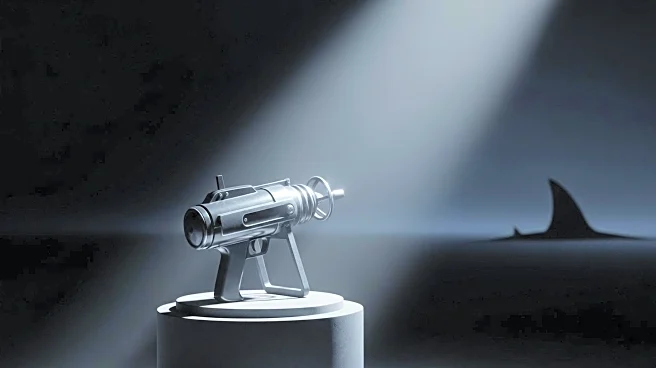What's Happening?
The horror film 'Weapons' has reclaimed the top spot at the North American box office during the Labor Day weekend, earning $10.2 million over the traditional weekend and an estimated $12.4 million through Monday. The film, directed by Zach Cregger, has accumulated $134.6 million domestically and $250 million globally, against a $38 million budget. Meanwhile, the 50th anniversary re-release of 'Jaws' garnered $8.1 million over the weekend and an estimated $9.8 million through Monday, outperforming new releases such as Sony's 'Caught Stealing' and Searchlight's 'The Roses'. 'Jaws' is credited with launching the summer blockbuster trend, influencing studios to release films during school vacations for maximum audience reach.
Why It's Important?
The box office performance of 'Weapons' and the 'Jaws' re-release highlights the enduring appeal of horror and classic films, even amidst new releases. Warner Bros.' success with 'Weapons' marks a rebound for the studio, which had a challenging start to the year. The re-release of 'Jaws' demonstrates the potential profitability of nostalgic cinema, as it continues to attract audiences decades after its original debut. This trend could encourage studios to invest in re-releases of other classic films, potentially reshaping box office strategies and influencing future film distribution models.
What's Next?
The box office landscape may continue to see a mix of new releases and re-releases of classic films, as studios explore strategies to maximize audience engagement and revenue. Warner Bros. may leverage the success of 'Weapons' to further bolster its lineup of horror films, while other studios might consider similar re-release strategies for their classic titles. The industry will likely monitor audience responses to these strategies, adjusting future releases accordingly to optimize box office performance.
Beyond the Headlines
The success of 'Jaws' re-release underscores the cultural impact of classic films and their ability to resonate with new generations. This phenomenon may lead to increased interest in film preservation and restoration, as studios recognize the value of maintaining and reintroducing iconic films to contemporary audiences. Additionally, the trend could influence the development of film education programs, emphasizing the historical significance and artistic merit of classic cinema.








